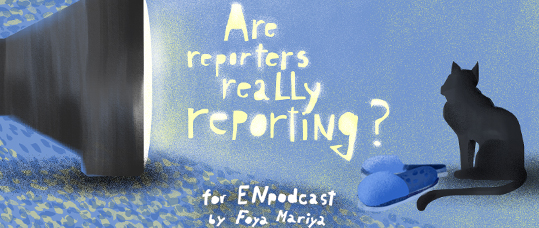Are Reporters Really Reporting?
The bulk of the information we receive is from the media. Watching newscasts online or live on TV. We have more knowledge than previous generations, and we have easier access to knowledge due to the internet. The job of a reporter has become more challenging in some aspects and easier in others because of technology.
Only a couple of decades ago if a reporter made a mistake or a gaff in reporting the news, it would only be seen by the people who were watching it live. Now reporters have to watch everything they say as you never know what clip of someone saying or doing something silly or outrageous, is going to be the next YouTube sensation.
There is also the problem of credible information and sources. Social media has made it easy for everyone to have an opinion visible to anyone. However, these sentiments are not facts. And occasionally reporters mistake people's online opinions for the facts of a story. This is what is known as irresponsible reporting. There are many people who work behind the scenes in newspapers and on television to fact-check all the information in articles and reports before they are made public, but sometimes there is a grey area. It can be difficult to discern facts from opinions. This is the crux of the problem with having so much information available at all times.
This becomes an even bigger problem because of impartiality. Reporters and journalists are said to be impartial. That is they do not discuss their beliefs and they reserve their judgements about what is happening. Reporters should remain neutral and only report the facts. With Twitter and Facebook followers watching their every tweet and post, reporters and journalists have begun to show their bias.
The most comical thing is when a report becomes the story they are trying to report. There are so many examples of this especially during large storms or hurricanes. In order to get the scoop about the storm, many reporters will stand outside in the middle of the storm and report on the conditions. Generally this backfires, and it does put the life of the reporter at risk. The irony is that the reporter is usually warning and telling people not to venture outdoors and to take shelter. However, they are not heeding their own advice. Soon enough, the weather conditions become too much to bear, and the reporter is sometimes tossed around and has objects come flying at them because of the horrible weather conditions.
So, what direction is the media heading? Stories about celebrities are making the nightly news; reports are being broadcast, and articles are being printed without being fact-checked. Sources from social media are being used as genuine sources in news stories. It seems as though the internet and the way we receive information are changing the journalism industry. They are trying to acclimate to the new technologies and are falling behind. Some news media, such as newspapers, are struggling. There have been significant losses in readership of print media. This might be a great thing, or it might not be. That is for you to think about and decide. Just remember when you hear a story on the news or read an article, you should keep some thoughts in the back of your mind. Who is writing or saying the information and where did they find their sources?
















